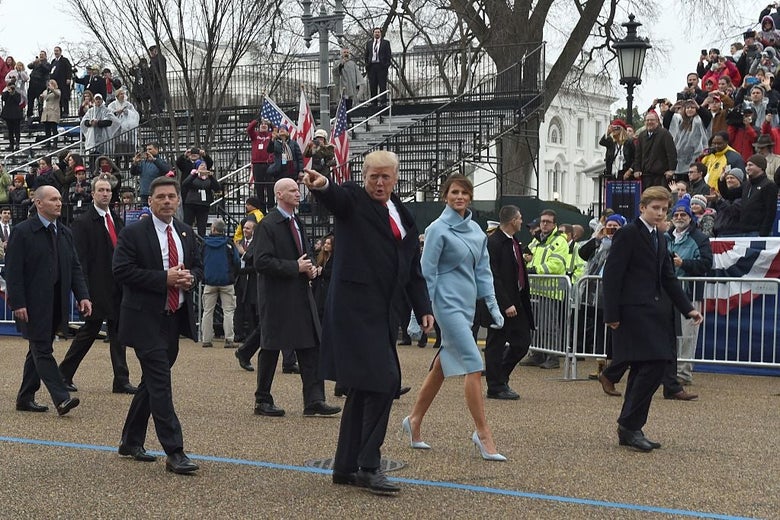
Inauguration Day.
Timothy A. Clary/AFP via Getty Images
Politico says that Donald Trump adviser Hope Hicks, who had left the White House to take a job at Fox, has returned to “a presidency in crisis.” Earlier this month, CNN reported that “the chaos and confusion rocking President Donald Trump’s administration” was “exceptional even by his own standards.” The New York Times wrote a few days ago that Trump is in a “sour” mood because he is taking criticism for his handling of the coronavirus while “isolated from the supporters, visitors, travel and golf that once entertained him.”
To hear the Washington, D.C. press corps tell it—particularly the reporters who work for the paper of record—Trump is somehow always both personally and politically in a state of escalatingly imminent collapse. On Election Eve in 2016, the Times reported a elegiac story from inside the Trump campaign plane, where “the Republican nominee does not like to rest or be alone with his thoughts,” as his staff faced “the neediness and vulnerability of a once-boastful candidate.” On Feb. 16, 2017, less than a month after his inauguration, the Times said that the president “has sometimes felt isolated in the White House” and was eager to engage in campaign-style rallies elsewhere. On May 31 of that year, it said he appeared “increasingly isolated inside the White House” because of “an unforgiving political environment.” Two weeks later, on June 13, he had purportedly “become increasingly isolated from his party and even his own staff since his abrupt firing of James B. Comey, the director of the F.B.I.” In August, he “found himself increasingly isolated in a racial crisis of his own making” because of his comments about the neo-Nazi rally in Charlottesville, Virginia. The following spring—on March 2, 2018—Trump was reported to be “isolated and angry” because of Robert Mueller’s special counsel investigation and disputes between White House officials. On April 14, the president “found himself increasingly isolated” because of Mueller-related legal action against his lawyer, Michael Cohen. On June 20, Trump had “grown isolated within the West Wing” because of staffing churn. On Sept. 14, the Times reported that the president seemed “increasingly isolated and distrustful of members of his own circle,” again because of legal issues. On Dec. 24, he was “increasingly isolated inside the White House” because of a government shutdown. A year later, on Dec. 20, 2019, he was “isolated” while “grappling with his new status as an impeached president.”
In total, at least fourteen Times reporters have written during Trump’s presidency that he was becoming more isolated. One reporter, Maggie Haberman, has written it eight times. Meanwhile, his aggregate approval rating has traveled all the way from 44.5 percent, on the day the first such story was published during his term, to 42.6 percent today. His popularity among Republican voters and legislators remains effectively unanimous. In other words, while Trump might well be “isolated” by historical standards of presidential popularity, the “increasingly” part has, in retrospect, never been justifiable.
Why does it persist? Here’s a theory: Political reporters operate with the understanding that being criticized by cable TV anchors, being implicated in crimes, and making inappropriate and uninformed public comments should deplete an elected official’s political capital. And the norms of mainstream reporting don’t allow them to say directly that a public figure—particularly a Republican one—has acted in a way that’s racist, crass, or stupid, because that would ostensibly demonstrate bias. So they write passively instead about the political circumstances those actions create. Since they can’t just say that Trump is stepping on rakes, they report that the mood in Washington is that he appears increasingly likely to be hit in the center of his face with a wooden rake handle. It seems safe to say, because such rules of cause and effect have always pertained before.
But while previous presidents owed their popularity at least partly to the meta-perception of their support among nonpartisan pundits and independent voters, Trump is beloved by his base supporters because he alienates everyone else, even if that alienation is the result of objective failures like suggesting that you can cure disease by injecting disinfectant into the human body. He is, truly, always spiraling and increasingly unhinged, but he never comes fully loose. He is Zeno’s President, halfway closer to being abandoned, then halfway closer again, heading for the target by a process that guarantees he can never reach it: a stupid paradox for our stupid era.
Readers like you make our work possible. Help us continue to provide the reporting, commentary and criticism you won’t find anywhere else.
Join Slate Plusfrom Slate Magazine https://ift.tt/35h4wBk
via IFTTT
沒有留言:
張貼留言